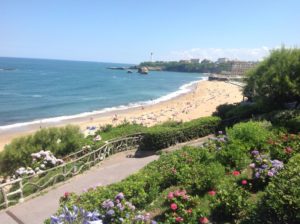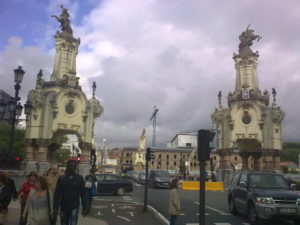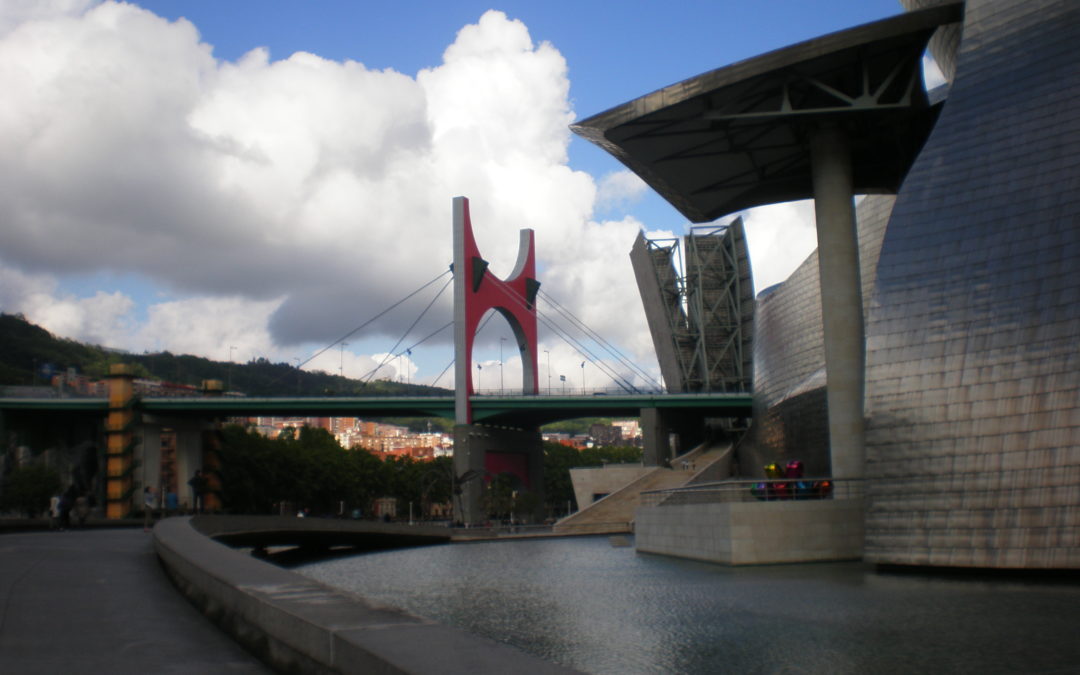![]() Traveling from the cool and cloudy Bilbao towards the sweltering heat of Barcelona, I feel a tinge of regret for the unseen, undiscovered, of inability to savor all the wonders of one place in a short period of time. In my mind’s eye, people and places I visited in the Basque country become alive.
Traveling from the cool and cloudy Bilbao towards the sweltering heat of Barcelona, I feel a tinge of regret for the unseen, undiscovered, of inability to savor all the wonders of one place in a short period of time. In my mind’s eye, people and places I visited in the Basque country become alive.
My travels first took me to sun-bathed Biarritz where easiness and quiet elegance, uninterrupted by the hassles of a big city, is a way of life. Then, to the picturesque neighboring villages of Saint Jean de Luz and Zokoa where the French Basque Coast has greeted me with a sharp contrast of blue Atlantic water, white houses and green hills so vividly colliding in a brilliant dance. In a conversation with a priest from Zokoa, Father Mikel, I heard a story of a tree representing Basque people for the first time. With a tear in his eye, Mikel talked about a perpetual struggle for dignity, the beauty of Basque language and its connection to the soul of the people and nature, ending his story with a simple statement: “Don’t cut the tree.”
 Next, I travelled further along the coast to the city of San Sebastian in Gipuzkoa, a region in the Basque autonomous region with the most Basque language speakers. The town is quite small and cozy, featuring many historical buildings and churches settled next to seafood restaurants and beaches. I skip the beach overflowing with people basking in June’s unrelenting sun to meet Julen Mendoza, the mayor of Renteria, a small town near San Sebastian. Once the scene of many conflicts and divisions, Renteria is now at the helm of a communal dialogue between victims and perpetrator’s families that are looking to overcome tensions and build a sustainable peace.
Next, I travelled further along the coast to the city of San Sebastian in Gipuzkoa, a region in the Basque autonomous region with the most Basque language speakers. The town is quite small and cozy, featuring many historical buildings and churches settled next to seafood restaurants and beaches. I skip the beach overflowing with people basking in June’s unrelenting sun to meet Julen Mendoza, the mayor of Renteria, a small town near San Sebastian. Once the scene of many conflicts and divisions, Renteria is now at the helm of a communal dialogue between victims and perpetrator’s families that are looking to overcome tensions and build a sustainable peace.
A researcher cannot focus on policies and the language of a nation without first meeting the people who reside in the remote villages of the rural Basque country. Away from the maddening crowd, I visited the mystic village of Zestoa in the Urola river valley, where people live simply and happily cushioned in the wellness of the known. In the outskirts of the village, I found the Gothic palace of Lili, and adjacent sat a farmhouse with an elderly couple shucking corn while sitting on a wooden bench overlooking the road. The old man with a Basque cap greeted me with a smile as I passed by him in search of mountain springs. He directed me to a winding path leading to the springs, which were perfectly refreshing. One cannot help but stand in awe when surrounded with such contrasts of green abundance and steep mountains, simplicity and sophistication of people, history and modernity. Pastures and woods remind me of Lorca’s revelry in green and Hemingway’s stories of fishing in mountain creeks of Navarre. Such unrelenting beauty not only purifies one’s mind and body, but it gives one energy to move forward.
Leaving the rural countryside behind we move on to Bilbao. Conversations with scholars and activists continue, broken only with a one day visit to Vitoria where I met with Jonan Fernandez. Renowned for its trees
and medieval city center, I venture past many of Vitoria’s 14th and 15th century sites on the way to Jonan’s office, which is located in a modern building. Jonan has been a leading figure in the Basque peace process. With a warm welcome, Jonan discusses the history and challenges of being a peacemaker, pointing at empathy and optimism as something he could not do without. I see Jonan again in a photo in the Peace Museum in Guernica, as one of the young peace activists in the 80s and 90s. A whole life dedicated to peacemaking.
 In Bilbao and Bayonne, I met several scholars that gave me a detailed outlook of the language policies and practices in both the Basque Autonomous Community and the French Basque country. A sharp difference can be seen between the two. While the French state proclaims egalitarianism and unity for all its citizens, it easily discards the rights of minority groups to preserve their unique cultural identity and language. The Basque language is not official in France and the situation does not look very optimistic. On the other hand, a historical oppression of the Spanish state towards the Basques and their language produced more resistance and struggle that resulted in eventual concessions and more autonomy for the Basques. The Basque language is official in the Basque Autonomous Community and the number of Basque speakers is growing.
In Bilbao and Bayonne, I met several scholars that gave me a detailed outlook of the language policies and practices in both the Basque Autonomous Community and the French Basque country. A sharp difference can be seen between the two. While the French state proclaims egalitarianism and unity for all its citizens, it easily discards the rights of minority groups to preserve their unique cultural identity and language. The Basque language is not official in France and the situation does not look very optimistic. On the other hand, a historical oppression of the Spanish state towards the Basques and their language produced more resistance and struggle that resulted in eventual concessions and more autonomy for the Basques. The Basque language is official in the Basque Autonomous Community and the number of Basque speakers is growing.
I leave the Basque Country with a plethora of impressions and ideas for new projects inspired by the ordinary and the extraordinary coexisting in a palpable tension. I pick up all the pieces and pour them into the new quest for meaning, love and beauty that make the reality of life.


Recent Comments